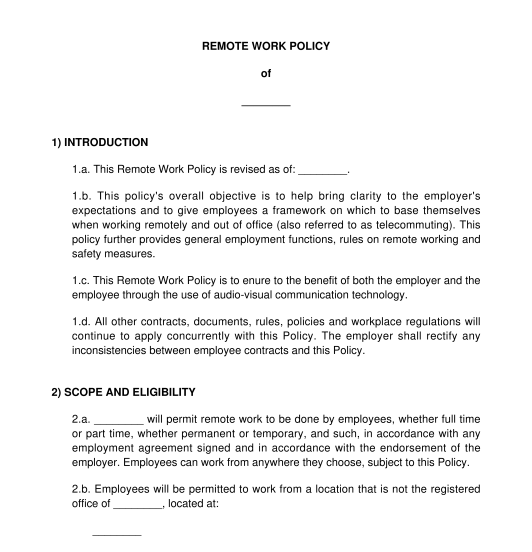 16/12/2024
16/12/2024

Answer a few questions and your document is created automatically.

Your document is ready! You will receive it in Word and PDF formats. You will be able to modify it.

 16/12/2024
16/12/2024
 Word and PDF
Word and PDF
 4 to 7 pages
4 to 7 pages
A remote work policy describes how and why things are done in a certain way for remote employees. Remote work means working from home or from somewhere other than the employer's headquarters or place of business. The Policy can apply to all employees or a certain selection and outlines the employer's expectations while working remotely, the employee's responsibilities, and the procedures of working from home.
No. Having a remote work policy is not mandatory, but it's recommended to help employees comply with rules on remote work. Although many believe that workplace policies are for large businesses, they are also strongly recommended for smaller businesses.
The general purpose of a workplace policy is to describe how things are done in a certain way to promote fairness and consistency in the workplace. A remote work policy is no exception and still aims to promote fairness and consistency for all remote employees alike.
Like this Remote Work Policy, there are many varying workplace policies, including an Occupational Health and Safety Policy, a Vacation Policy, a Workplace Social Media Policy, a Workplace Technology Security Policy, and more.
A Remote Work Policy should address remote workplace functions, such as:
Additionally, the policy should contain a section that states that all remote employees will follow this Policy and adhere to clauses on maintaining communications with supervisors during working hours. Employees must also follow cybersecurity measures that the employer outlines.
There is no set duration of an employment policy as they normally subsist for the duration of the lifetime of the employer's organization. In other words, the duration is indefinite. However, policies must be amended to reflect the changes in legislation and should be refined to adapt to industry standards. This means that as things change, so should the company's policy.
Once the remote work policy is ready, the employer must deliver it to employees who will be working remotely. If the employer has a physical office location, keep a copy of the Policy in a conspicuous place in the event employees also have the option of going to the office.
Employers should include this Policy in a new employee's welcome package to ensure they are familiar with workplace protocol and avoid any future doubt that they were unaware of a specific rule or company policy.
When significant changes arise in the Policy, the employer should provide a copy of the new policy to all staff in a timely manner.
Employees should also sign the acknowledgement, either electronically or physically, at the end of the document confirming they read and understand the Remote Work Policy. The employer should then add a copy of the signed Policy to each employee's file. As stated in the Policy, employees will be made aware that non-compliance with the document may lead to termination of employment.
Employment policies must be consistent with the law. In Canada, employment law is governed by legislation and case law. The following pieces of legislation govern employment law:
Ontario: Employment Standards Act, 2000, S.O. 2000, c. 41
Alberta: Employment Standards Code, RSA 2000, c E-9
British Columbia: Employment Standards Act, RSBC 1996, c 113
Saskatchewan: The Saskatchewan Employment Act, SS 2013, c S-15.1
Manitoba: The Employment Standards Code, CCSM c E110
Quebec: Act respecting labour standards, CQLR c N-1.1
New Brunswick: Employment Standards Act, SNB 1982, c E-7.2
Nova Scotia: Labour Standards Code, RSNS 1989, c 246
Prince Edward Island: Employment Standards Act, RSPEI 1988, c E-6.2
Northwest Territories: Employment Standards Act, SNWT 2007, c 13
Nunavut: Labour Standards Act, RSNWT (Nu) 1988, c L-1
Yukon: Employment Standards Act, RSY 2002, c 72
Newfoundland and Labrador: Labour Standards Act, RSNL 1990, c L-2
Canada: Canada Labour Code, RSC 1985, c L-2
You fill out a form. The document is created before your eyes as you respond to the questions.
At the end, you receive it in Word and PDF formats. You can modify it and reuse it.
Remote Work Policy - Sample, template - Word & PDF
Country: Canada (English)